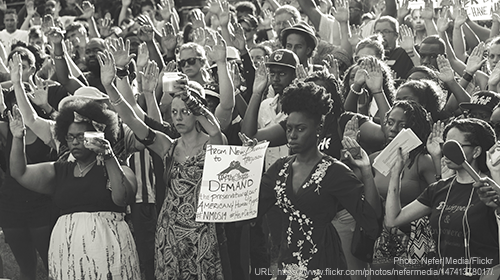Over 100 People Were Killed by Police in March. Have Police Gotten the Post-Ferguson Memo Yet?


Here’s a statistic for you: It's been 31 days since the release of the White House Task Force on 21st Century Policing report, but the number of fatal police encounters is already over 100 and counting. That’s an average of more than three people killed each day in March by police in America.
Too many of this month’s victims fit a profile we know all too well – unarmed men of color, some of whom have psychiatric disabilities. Victims like Charly Keunang in Los Angeles, California; Tony Robinson in Madison, Wisconsin; Anthony Hill in DeKalb County, Georgia; and Brandon Jones in Cleveland, Ohio; confirm that the problems with policing are national in scope.
This isn’t a problem concentrated in a few rogue police departments. Even those police departments with the best of intentions need reform. Take, for example, last week’s Department of Justice report that Philadelphia police shot 400 people – over 80 percent African-American – in seven years. This is in a city where the police commissioner is an author of the very same White House task force report calling for police reform.
So clearly we must do more than read – or even write – these reports. Report recommendations, several of which are adopted from ACLU recommendations, must be implemented. The task force report makes 63 recommendations, but let’s focus on just two. Neither one is novel, but both are critical to real police reform.
Deescalate Situations
This is stating the obvious, but clearly it needs to be repeated – police departments should adopt use-of-force policies that emphasize de-escalation.
Excessive and deadly use of force, disproportionately against people of color and people with psychiatric disabilities, is driving national discourse. Jaywalking and selling individual cigarettes should not result in death – nor should failing to take your medication.
The ACLU told the task force that de-escalation, training, and incident review are necessary components to any use-of-force policy. The task force agreed, recommending that, “Law enforcement agency policies for training on use of force should emphasize de-escalation and alternatives to arrest or summons in situations where appropriate.”
DOJ’s Community Oriented Policing Services office must continue working with local police departments to implement appropriate use-of-force standards. The federal government must commit the appropriate resources for this.
And particular attention must be paid to how these policies are impacting people of color, people with disabilities, and other marginalized populations. Otherwise police will continue to be seen as an oppressive force in certain communities, thereby making community policing impossible.
Collect Data
The public needs legitimate data collection practices that promote transparency and accountability when police use unreasonable force. We need something a little more thoughtful than a Google search to give us the stats on the number of police shootings – fatal or nonfatal – in any given period of time.
As the ACLU explained to the task force, data collection and reporting is the easiest single thing any police department can do starting today. And it will offer the best depiction of what policing in the 21st century looks like.
Both the ACLU and the task force recommend data collection on a range of police and citizen encounters – from stops and arrests to nonfatal and fatal police shootings. “Policies on use of force,” the task force writes, “should also require agencies to collect, maintain, and report data to the Federal Government on all officer-involved shootings, whether fatal or nonfatal, as well as any in-custody death.” And data must be inclusive not just of race and gender but disability as well.
In order for local law enforcement to get serious about data collection, it may take the dangling of federal dollars. The recently enacted Death in Custody Act, which requires data collection on what the title suggests, is taking that approach by penalizing noncompliant agencies through Department of Justice funds. Earlier mandates around data collection – ones that allow law enforcement to voluntarily report data without penalty —aren’t working.
The task force report – like so many others before it – has spelled out what’s needed for police reform. How many more reports or police shootings do we need before we get to work?



